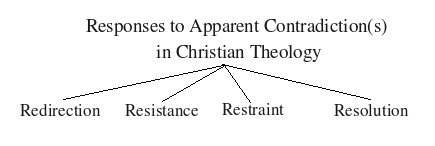the evolution of my views on the Trinity – part 5
Thinking about Trinity in grad school, reading Richard Swinburne’s The Christian God.
Thinking about Trinity in grad school, reading Richard Swinburne’s The Christian God.
From left to right: Oliver Crisp’s Beard, Oliver Crisp, Thomas McCall, Fred Sanders, Karen Kilby, Lewis Ayres, and Stephen Holmes. In this episode I share my reflections on this conference, and specifically on Trinity theories in contemporary academic theology. You can also listen to this episode on Stitcher or iTunes (please subscribe, rate, and review us in either or both – directions here). It is also available on YouTube (you can subscribe… Read More »podcast 23 – report from the second annual Los Angeles Theology Conference
Wheeeeee! Everything is “Trinitarian” now.

This chart has been brought to you by the letter “R” and the number “4”.
In this series I’ll describe 4 basic ways Christian thinkers respond to apparent contradictions in theology. I don’t claim these are complete. Maybe ya’ll can help me clarify and add to this scheme.
I’ve been working for a while on what I call “mysterianism”, and a main purpose of mine here is to locate this defense strategy and contrast it with others. (Mysterianism is a kind of Resistance.)
Above is my basic division. Future posts will give more detail, but here’s a brief illustration of each sort of response.
Jesus was “in the form of God,” but chose to empty himself, becoming like us. What do these famous statements by Paul mean? In episode 48, I examined a common evangelical interpretation of this text and found it lacking. In this episode, I compare scripture with scripture, to try to come up with a plausible, understandable, well-motivated interpretation. Can the authors of Genesis, Isaiah, Hebrews, and Revelation,… Read More »podcast 49 – 2 interpretations of Philippians 2 – part 2
Here is my paraphrase of the argument in ch.18: It might seem that supreme goodness can exist where one person supremely loves and receives nothing in return from the other person for full happiness. But in fact such supreme goodness can’t even exist where only two persons mutually love each other. Suppose that, in divinity, there are only two persons. Then each gives and receives… Read More »Richard of St. Victor’s De Trinitate, Ch.18 (Joseph)
In his 2014 book Deviant Calvinism, Dr. Oliver Crisp explores the boundaries of Reformed theology by way of various historical theologians.
In this episode I talk with Professor Timothy Winter (a.k.a. Shaikh Abdal-Hakim Murad), an Islamic theologian at Cambridge University. He’s the author of a chapter called “The Trinity is Incoherent” in the 2013 collection edited by J.P. Moreland, Chad Meister, and Khaldoun A. Sweis, Debating Christian Theism. It was paired with a chapter by Dr. Tom Senor, a Christian philosopher from the University of Arkansas, called “The… Read More »podcast 46 – Professor Timothy Winter’s Islamic perspective on the Trinity

If you defend a problematic doctrine as a Mystery, you’re asserting that it to some degree lacks what I call “understandable” content. “Understandable” content is a proposition (thought, claim) that positively seems consistent to you. A claim may fail to be understandable for one of two reasons.Read More »Dealing with Apparent Contradictions: Part 15 – Positive vs. Negative Mysterianism
 At long last, we’ve reached the 25th and last chapter of book three of Richard of St. Victor’s De Trinitate! (Here are the other Richard-related posts here @ trinities.)
At long last, we’ve reached the 25th and last chapter of book three of Richard of St. Victor’s De Trinitate! (Here are the other Richard-related posts here @ trinities.)
Richard starts off with the point that for the Persons of the Trinity, unlike the case of any other persons, there is “individuality without plurality” – each is what it is without any plurality of any kind – and “unity without inequality” – I’m not sure what he means by this second phrase. (p. 396)
In contrast, any other person, such as you or me, can be “unequal to himself”, in that we can become greater or lesser over time. (e.g. I’m smarter and morally better now than when I was 14.) And persons like us have multiple properties (we’re not simple). (p. 396) And of a human person, say Barak Obama, we can say that “his power alone is dissimilar to itself… [since] one thing is easy for him, another is difficult and a third is impossible.” (p. 397)
Then he says, “one and the same nature… in one respect is less, in another it is greater, and [so is]… dissimilar and unequal to itself.” (p. 397) So, the same point he made about persons, can also be made about natures. Thus,Read More »Richard of St. Victor’s De Trinitate, Ch. 25 (Dale)

Enthusiastic positive mysterians tend to be complacent traditionalists about Bible interpretation – that is, people who are pretty sure that their Christian group (e.g. Catholicism, Reformed Christianity, or maybe simply small-c catholicism) has got the Bible (generally) right. There is a reason for this.
The reason is that if you’re trying to reason your way towards the correct interpretation of some passage, rather than rest on the laurels of hoary precedent, then it looks like a show-stopper if your proposed interpretation seems self-contradictory (positive mysterianism), or unintelligible (negative mysterianism).Read More »Dealing with Apparent Contradictions: Part 18 – Mysteries and the Bible (Dale)
The tradition of three-self trinitarian art continues, in the cartoons of “nakedpastor.” The way your portray a self, is generally by portraying the type of self we’re most familiar with – a human self, or something like one. At least the Holy Ghost isn’t a bird… but here he look like a kid in a bad Halloween costume. 🙂 If you’re going to cartoon about… Read More »As usual, the Holy Ghost gets the worst of it
Just recently on Facebook, I’ve been quoted a famous text, verses which for hundreds of years were a favorite trinitarian proof text, seemingly the “smoking gun” verse that was needed – 1 John 5:7-8. Here’s how it reads in the King James Bible: For there are three that bear record in heaven, the Father, the Word, and the Holy Ghost: and these three are one. And there are… Read More »On the corruption of 1 John 5:7-8, the “Comma Johanneum”
Congratulations to trinities contributor J.T. Paasch on his new book Divine Production in Late Medieval Trinitarian Theology: Henry of Ghent, Duns Scotus, and William Ockham, now available in the U.K. I trust he’ll let us know when it comes out in the U.S. The Amazon blurb, with bolding gratuitously added by me: According to the doctrine of the Trinity, the Father, Son, and Spirit are… Read More »New book by J.T. Paasch
Returning from my travels, it seems I’ve recently received two issues of Faith and Philosophy, dated Oct 2006 and Jan 2007. There are several bits that may be of interest to readers of this blog.Read More »Some good stuff in Faith & Philosophy
In this episode we meet new trinities contributor Mr. Chad McIntosh, a PhD student in Philosophy at Cornell University. We discuss his interest in the Trinity, the Trinity as a “holy mystery,” the concept person, why thinking about this issue is important, William Lane Craig’s Cerberus analogy, and whether the Trinity is found in the Bible or only in later tradition
Somehow I missed this when it came out back in July. Our friend the Tentative Apologist Randal Rauser has a podcast (itunes) now, and he’s done a substantial, no-bs interview of leading Reformed analytic theologian Oliver Crisp, of Fuller Seminary. Listen to it at Randal’s blog here. Crisp does a good job presenting and giving a basic defense of the coherence of the traditional catholic… Read More »analytic theologian Oliver Crisp on the coherence of Incarnation
Note: this review originally appeared in Religious Studies Review. FAITH LACKING UNDERSTANDING: THEOLOGY ‘THROUGH A GLASS DARKLY’. By Randal Rauser. Colorado Springs, CO: Paternoster, 2008. This rausing little book is a work of popular philosophical theology which exhibits uncommon intellectual honesty, courage, humor, clarity, and insight. Each chapter but the first is devoted to a doctrine of the Apostles’ Creed: Trinity, Creation, Incarnation, Atonement, Ascension,… Read More »Book review: Randal Rauser’s Faith Lacking Understanding
Can it be easily shown that the Bible implies that God is tripersonal?
Live-streamed discussions with Josiah of Integrity Syndicate on two famously difficult New Testament texts.